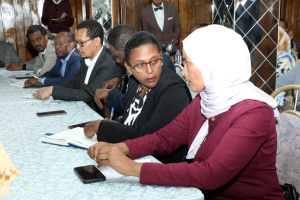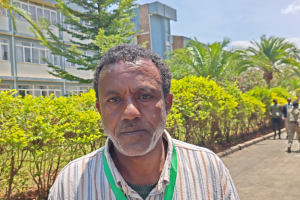
ADDIS ABABA – In a remarkable step toward empowering women and advancing menstrual health, the UNIDO Investment and Technology Promotion Office (ITPO) Tokyo, in collaboration with the UNIDO Subregional Office in Ethiopia, celebrated the graduation of 114 young professionals — including 100 women and 14 men — from an intensive vocational training in sewing techniques for female sanitary shorts.
Held at Selam Technical and Vocational College, the graduation marked the successful completion of a cutting-edge program that equips youth with practical skills using the latest Japanese technology, made possible through the generous support of the Government of Japan.
The event brought together a distinguished group of guests, including Netsu Shintaro, Deputy Chief of Mission at the Embassy of Japan to Ethiopia, , Ministry of Labor and Skills Muhedin Abamoga, Selam Children’s Village Managing Director Solomon Chali,, , Ethiopia’s UNIDO’s Subregional Office Bogale Feleke, , Ethiopia’s ITOCHU Commercial Representative Office Managing Director and UNIDO ITPO Tokyo Representatives Akiko Shinoda.
The training, jointly organized by UNIDO ITPO Tokyo, Selam Technical and Vocational College, ITOCHU Corporation, and Be-A Japan, focused on the production of safe, reusable sanitary products—a vital step in improving menstrual health and hygiene, breaking taboos, and supporting economic empowerment.
“This program does more than teach sewing,” said Netsu Shintaro. “It empowers women and girls to become change-makers in their communities and active contributors to Ethiopia’s economy. Japan is proud to support such impactful initiatives through UNIDO.”
For many graduates, the program has opened the door to new opportunities—whether it’s launching small businesses or securing employment in Ethiopia’s growing garment sector.
Muhedin Abamoga reaffirmed the Ethiopian government’s commitment to promoting vocational training as a driver of entrepreneurship and self-reliance. “This initiative aligns with our vision of fostering job creation and inclusive economic growth,” he said.
The project not only helps to normalize conversations around menstruation but also addresses critical gaps in access to affordable, eco-friendly menstrual products—especially in underserved communities.
As the graduates proudly received their certificates, there was a shared sense of achievement and hope for a future shaped by dignity, innovation, and opportunity.
THE ETHIOPIAN HERALD SUNDAY EDITION 6 APRIL 2025





